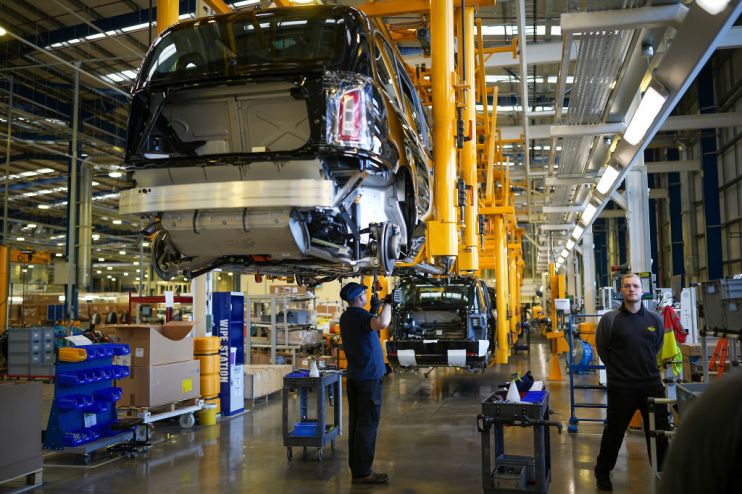Angry car makers: Delaying petrol and diesel ban will damage EV investment in UK

Leading car manufacturers have urged the government to give clarity on its proposed row back on banning petrol and diesel cars, saying they’ve invested hundreds of millions to meet targets.
Mike Hawes, chief executive of the Society of Motor Manufacturers and Traders (SMMT), said the policy change will cause “concern” among car makers.
It has been widely reported that the ban on the sale of new petrol and diesel cars and vans will be pushed back from 2030 to 2035.
Mr Hawes told BBC Radio 4’s Today programme that high demand for electric cars within the UK is needed if more are to be built in the country.
He said: “You want to build close to where you sell, so you need a strong market here in the UK to help secure future investment.
“The concern now is, does this cause consumers to delay their purchase?”
Home secretary Suella Braverman also went on the media rounds on Wednesday morning defending the policy, claiming “we are not going to save the planet by bankrupting Britain”, after the government rowed back its green pledges.
Meanwhile, Lisa Brankin, the chair of Ford UK issued a furious statement, as reported by Sky News.
“Three years ago the government announced the UK’s transition to electric car and van sales from 2030. The auto industry is investing to meet that challenge.”
She said Ford had committed $50bn to electrification with nine electric vehicles by 2025, including a £430m investment in Ford UK’s facilities, with more funding planned for the 2030 timeline.
She said the “biggest industry transformation in over a century and the UK 2030 target is a vital catalyst to accelerate Ford into a cleaner future.”
Lashing out at Rishi Sunak, she said “our business needs three things from the UK government: Ambition, commitment and consistency”.
“A relaxation of 2030 would undermine all three. We need the policy focus trained on bolstering the EV market in the short term and supporting consumers while headwinds are strong: Infrastructure remains immature, tariffs loom and the cost of living is high.”
BMW declined to comment, but said it and the entire industry needed clarity on the issue.
A Jaguar Land Rover spokesperson told City A.M. that it “is investing £15bn over the next five years to electrify our luxury brands, which is key to JLR reaching net zero carbon emissions across our supply chain, products, and operations by 2039. “
“Our plans are on track and we welcome certainty around legislation for the end of sale of petrol and diesel powered cars.”
SMMT figures show the private share of the market for battery electric new cars has already fallen from more than a third (36.2%) in the first half of 2022 to less than a quarter (24.2%) during the same period this year.
Demand has grown for fleet registrations, partly due to the lower company car tax for electric cars.
Mr Hawes said he was “assured” on Monday that the zero emission vehicles mandate – a requirement for manufacturers to increase the proportion of new cars and vans they sell that are zero emission – will still be introduced.
It is due to be implemented from the beginning of next year.
Mr Hawes said: “We’re trying to understand what is going to happen next between this sort of statement (on the 2030 ban) and that policy, and the message it sends consumers which must be incredibly confusing.”
Ian Plummer, commercial director at online vehicle marketplace Auto Trader, said: “Pushing back the 2030 ban on new petrol and diesel sales by five years is a hugely retrograde step which puts politics ahead of net zero goals.
“This U-turn will cause a huge headache for manufacturers, who are crying out for clarity and consistency, and it is hardly going to encourage the vast majority of drivers who are yet to buy an electric car to make the switch.
“Rather than grasp the challenge and use the tax system to ease concerns over affordability, the Prime Minister has taken the easy option with one eye on polling day.”
But Tory MP for Lincoln Karl McCartney described the Prime Minister’s reported plans as “the common sense decision”.
He said the “costs to normal drivers will be too high” if the 2030 ban was maintained.
He added: “The only people who will complain about this delay are the central London eco-zealots who do not live in the real world and are rich enough not to be affected.”
Press Association – Neil Lancefield